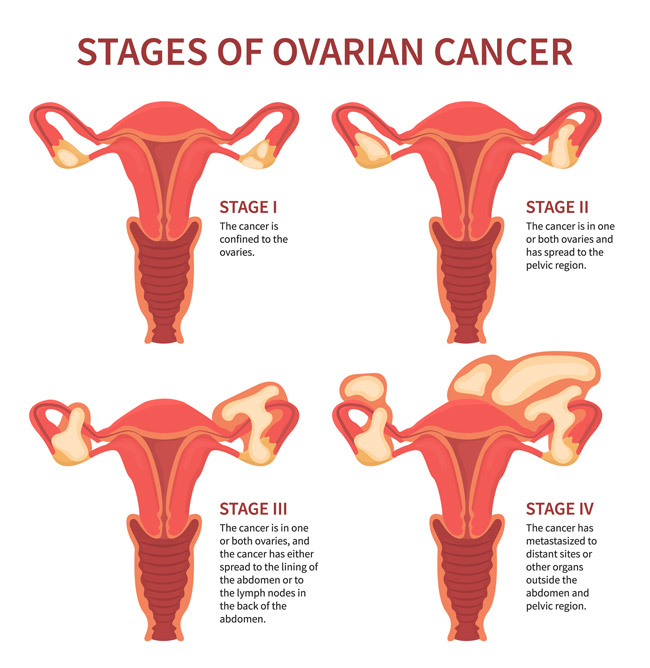What is Ovarian Cancer?
Ovarian cancer is a type of cancer that begins in the ovaries, the reproductive glands in women that produce eggs and hormones like estrogen and progesterone. Ovarian cancer is often difficult to detect in its early stages because its symptoms are vague and may be mistaken for other conditions. When ovarian cancer is detected, it may be at an advanced stage, making it more challenging to treat. However, early detection through regular screenings and prompt treatment significantly improves outcomes.
Symptoms of Ovarian Cancer
The symptoms of ovarian cancer can be subtle and often overlap with other, less serious conditions. Common signs include:
- Abdominal Bloating: Persistent bloating or a feeling of fullness.
- Pelvic Pain: Discomfort or pain in the pelvic region, especially after eating.
- Changes in Bowel Habits: Constipation, diarrhea, or changes in stool consistency.
- Frequent Urination: Increased urgency or frequency of urination.
- Fatigue: Unexplained tiredness that doesn’t improve with rest.
- Loss of Appetite: Unexplained loss of appetite or early satiety.
- Unexplained Weight Loss: Sudden, unexplained weight loss despite no change in diet.
If you are experiencing these symptoms regularly or if they worsen over time, it is important to consult a healthcare provider for evaluation and testing.
How is Ovarian Cancer Diagnosed?
Diagnosis of ovarian cancer involves several steps:
- Medical History and Symptoms Review: The doctor will take a complete medical history, including a family history of ovarian cancer or other cancers.
- Pelvic Exam: A physical exam may help detect abnormalities in the ovaries or pelvic area.
- Blood Tests: The CA-125 blood test is often used to detect elevated levels of cancer antigen 125, a substance that can indicate ovarian cancer, although it can also be elevated in non-cancerous conditions.
- Imaging Tests: Ultrasound, CT scans, or MRIs can help detect ovarian tumors or abnormalities in the ovaries.
- Biopsy: In some cases, a tissue sample may be taken for further testing to confirm the presence of cancer.
- Laparoscopy: A minimally invasive procedure that involves inserting a small camera into the abdomen to view and take samples of the ovarian tissue. This is often done to stage the cancer.
Ovarian Cancer Surgery Treatment Options
Surgery is the primary treatment for ovarian cancer, and it is often used to remove as much of the cancerous tissue as possible. The goal is to eliminate the tumor(s) and any cancerous growths in the surrounding areas to reduce the risk of the cancer spreading. Treatment options include:
1. Debulking Surgery
This is the most common surgery for ovarian cancer. The surgeon removes as much of the tumor as possible, including the affected ovaries, fallopian tubes, and surrounding tissues. In advanced stages of ovarian cancer, debulking surgery aims to reduce the size of the tumors and improve the effectiveness of subsequent treatments like chemotherapy.
2. Total Hysterectomy with Bilateral Salpingo-Oophorectomy
In many cases, surgery will involve the removal of both ovaries, the fallopian tubes, the uterus, and sometimes the omentum (the fatty tissue covering the abdomen) if cancer is found there.
3. Laparoscopy
A minimally invasive procedure that involves small incisions and a camera to visualize the abdomen. It can be used for biopsy, staging, or as a less invasive method of debulking the tumor in early-stage cancers.
4. Staging Surgery
In addition to removing visible tumors, staging surgery may involve biopsies of nearby lymph nodes and other tissues to determine the extent or stage of the cancer. This helps inform further treatment decisions, such as chemotherapy or radiation.
Post-Surgery Treatment Options
After surgery, additional treatments are often recommended to eliminate any remaining cancer cells and reduce the risk of recurrence. These may include:
Chemotherapy
Chemotherapy is commonly administered after ovarian cancer surgery to kill any remaining cancer cells. It is often given intravenously or in some cases directly into the abdomen. The standard chemotherapy drugs used for ovarian cancer include carboplatin and paclitaxel.
Targeted Therapy
Targeted therapies focus on specific molecules involved in cancer growth, making them more effective in treating cancer while minimizing damage to healthy cells. These treatments may be used in combination with chemotherapy.
Radiation Therapy
In certain cases, radiation therapy is used to target specific areas where cancer is likely to recur, such as the abdomen or pelvis.
Immunotherapy
A newer treatment option that stimulates the body's immune system to attack cancer cells.
Benefits of Ovarian Cancer Surgery
- Tumor Removal: Surgical intervention aims to remove as much cancerous tissue as possible, improving prognosis.
- Improved Quality of Life: Reducing the tumor burden can help alleviate symptoms like bloating, pain, and discomfort.
- Access to Further Treatment: Surgery provides an opportunity to evaluate the cancer stage, informing the need for additional treatments like chemotherapy or targeted therapies.
- Personalized Care: Each surgery is tailored to the individual’s specific diagnosis, offering the best chance for successful treatment.
Why Choose Healthour for Ovarian Cancer Surgery?
- Expert Care: Our team of oncologists and surgeons provides personalized, compassionate care for ovarian cancer patients.
- Comprehensive Treatment: We offer surgery, chemotherapy, targeted therapy, and emotional support to ensure the best possible outcome for each patient.
- Minimally Invasive Options: We use the latest minimally invasive techniques, such as laparoscopy, to reduce recovery time and improve outcomes.
- State-of-the-Art Facilities: Our clinic is equipped with cutting-edge diagnostic and treatment technologies to offer the highest standard of care.
- Holistic Support: From diagnosis through recovery, we provide emotional, psychological, and physical support to guide you through your treatment journey.
- High Success Rates: Our experienced team has a proven track record of successful ovarian cancer surgeries and treatment outcomes.
Steps to Start Your Ovarian Cancer Surgery Journey
- Consultation: Schedule an appointment with our specialist to discuss your symptoms, medical history, and treatment goals.
- Diagnosis: Undergo diagnostic tests such as pelvic exams, imaging scans, and blood tests to determine the presence of ovarian cancer.
- Surgery Plan: Our team will create a personalized surgery plan tailored to the stage and location of the cancer.
- Post-Surgery Care: Following surgery, you will receive ongoing support, including chemotherapy, targeted therapy, or radiation therapy as needed.
- Recovery and Follow-Up: We provide comprehensive follow-up care to monitor recovery and ensure optimal results.
Contact Us for Expert Ovarian Cancer Surgery
If you or a loved one has been diagnosed with ovarian cancer, our team is here to support you. Contact us today to schedule a consultation and take the first step toward personalized treatment and recovery.
FAQs About Ovarian Cancer Surgery
- What is ovarian cancer surgery?
Ovarian cancer surgery aims to remove as much of the tumor as possible to eliminate cancer and reduce the risk of recurrence.
- What are the different types of surgery for ovarian cancer?
Surgical options include debulking surgery, total hysterectomy, laparoscopic surgery, and staging surgery.
- How long does recovery take after ovarian cancer surgery?
Recovery varies depending on the extent of the surgery, but most patients recover within 4-6 weeks.
- What is the role of chemotherapy after ovarian cancer surgery?
Chemotherapy is often given post-surgery to kill any remaining cancer cells and reduce the risk of recurrence.
- Can ovarian cancer be cured with surgery?
While surgery can significantly improve outcomes, ovarian cancer may recur, and additional treatments such as chemotherapy or immunotherapy may be necessary.
- Is laparoscopic surgery for ovarian cancer safe?
Yes, laparoscopic surgery is a safe, minimally invasive procedure that reduces recovery time and hospital stays.
- How do I know if I need ovarian cancer surgery?
Surgery is recommended based on the stage and location of the cancer, which will be determined through diagnostic testing.
- What are the risks of ovarian cancer surgery?
Risks include infection, bleeding, and damage to surrounding organs, but these risks are minimized with experienced surgeons and proper care.
- How will ovarian cancer surgery affect my fertility?
Fertility may be affected if the ovaries or uterus are removed, but fertility preservation options are available for patients who wish to have children in the future.
- How can I manage my emotions during ovarian cancer treatment?
We provide counseling and emotional support services to help patients navigate the emotional challenges associated with ovarian cancer treatment.



